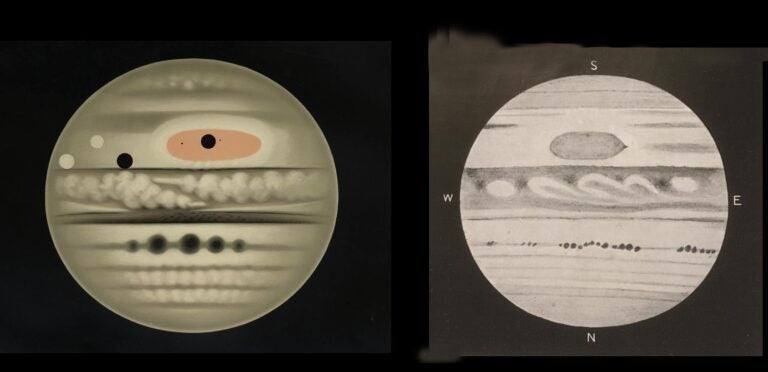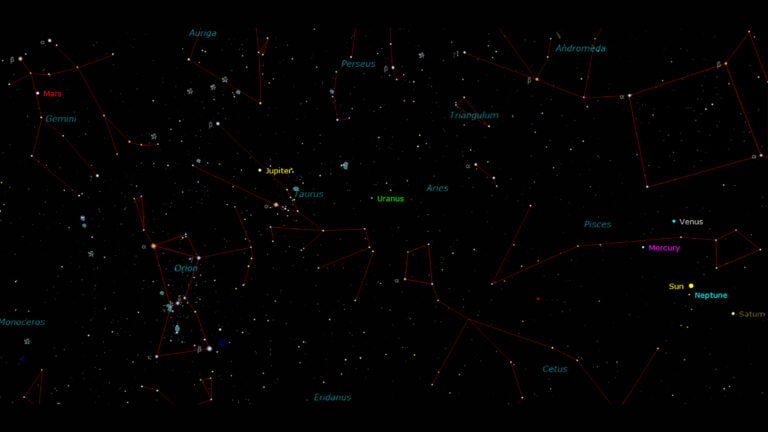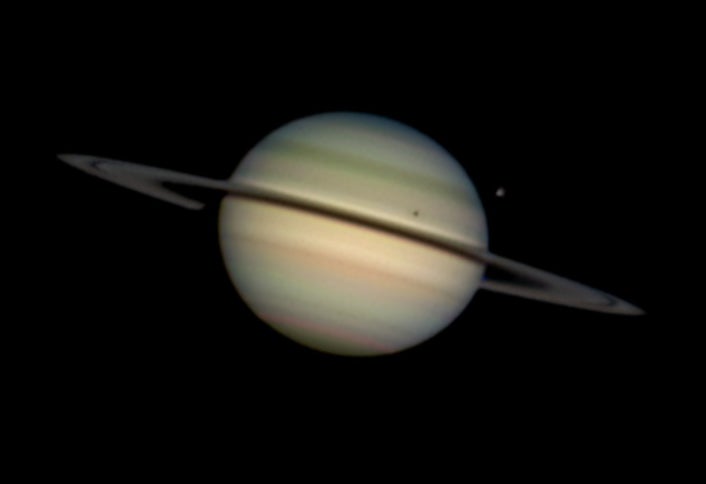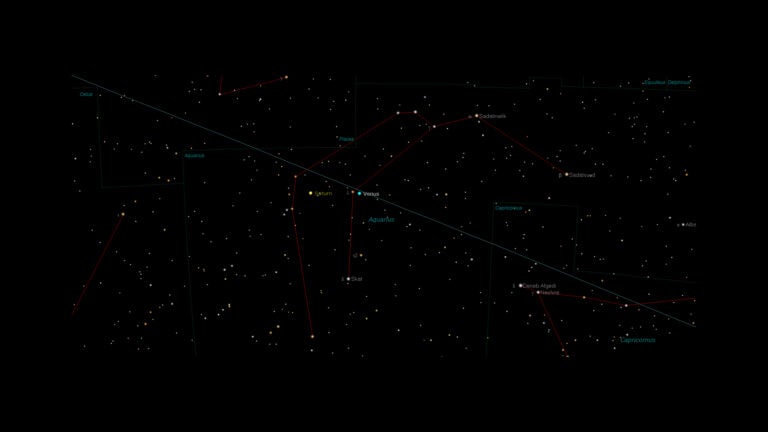The scene unfolds 45 minutes before sunrise. The action starts October 8 when from top to bottom stands a dramatic straight line composed of the Moon, Venus, Mars, Jupiter, and then Mercury down low. The next two mornings, the Moon floats smack among them. Then on the 11th, the hair-thin crescent Moon hovers next to Mercury.
The action resumes on the 16th, 17th, and 18th when Jupiter closely meets dim Mars with dazzling Venus above them and brightening Mercury below. A week later, Venus and Jupiter float rivetingly side by side. Add Saturn in the evening sky just two constellations over, and it’s clear that all the naked-eye planets plus the Sun stand in the same general direction. Does this put the solar system out of balance like a badly loaded washing machine?
Well, when the heavyweights Saturn and Jupiter pull in the same direction, the Sun is physically yanked one Sun-width. As everything whirls around the solar system’s barycenter, the Sun is therefore not currently in its average place in our sky. Can this planet business also affect us?
Massive Jupiter acts like a vacuum cleaner for asteroids and comets, deflecting them from hitting us. On the other hand, pieces of Mars do occasionally smash into Earth. Of the more than 52,000 known meteorites, 155 came from the Red Planet. So it is possible for Mars to kill you.
But unlikely. In the 20th century, only one person was ever hit by a meteorite, a stony asteroid fragment, so “the god of war” will probably not single you out for annihilation.
What about meddling with your everyday affairs? This brings us to astrology for the very first time. Nearly half of all Americans believe in it at least somewhat. Millions think the planets influence their romances, finances, and such. Does this ancient practice contain a germ of truth?
No. The topic fascinated me in the 1980s, which led to serious research and a formal broadcast debate with the editor of the Larousse Encyclopedia of Astrology. It also taught me a valuable lesson: When discussing astrology, never reveal your “sign.” If you do, the conversation may go something like this.
MILLIONS THINK THE PLANETS INFLUENCE THEIR ROMANCES, FINANCES, AND SUCH.
You: “I’m a Gemini.”
Astrologer: “Whoa! You say you don’t believe in astrology, but can’t you see you’re a perfect Gemini? There are twins inside you. You enjoy travel but also like to stay home. You like your freedom but also the security of a relationship. You have a split personality. You’re a classic Gemini!”
And then you feel like a jerk, with no rebuttal. So instead, tell a little white lie. Now the conversation changes:
Astrologer: “What’s your sign?”
You: “I’m a Taurus.”
Astrologer: “Holy Toledo! Can’t you see how you’re a perfect Taurus? You’re stubborn about science and inflexible about ancient wisdom — a classic Taurus personality!”
You: “I’m just kidding. I’m not a Taurus.”
Astrologer (flustered): “You’re not? Well, um, what’s your real sign?”
You: “Scorpio.”
Astrologer: “I knew it! The way you just tried to exercise power over our conversation. A control freak. You’re a classic Scorpio.”
You: “I lied. I’m not a Scorpio either.”
At this point, you’d think the astrologer might question his craft, since you’ve effectively demonstrated how they make signs fit anyone. In practice, however, astrologers usually resist all forms of logic.
How can we be sure astrology is bogus? Countless studies. For example, astrology says that a person whose horoscope shows Mars in Aries is inclined toward a military career. So one study looked at 5,000 people who’d re-enlisted in the Marines. It would be unfair to demand they all have Mars in Aries. But if that concept has any meaning at all, that pattern would occur more than would be expected randomly. Turns out, just one in 12 Marines have Mars in Aries — exactly what’s dictated by chance. Sadly, after studies such as this are published, the next astrology textbook editions continue with the same Mars/Aries/soldier business. Apparently, reality is of no interest to them.
One clever study even showed why astrology can seem to work. So if any reader is into it (you never know), well, have fun, but don’t imagine it has any scientific support.
Despite all this, planets can influence your behavior. They’ll make you get up before dawn this month, won’t they?
Anyway, forgive this anti-astrology tirade. I can’t help it. I’m an Aquarius, and we Aquarians tend to be skeptical.
Contact me about my strange universe by visiting http://skymanbob.com.










